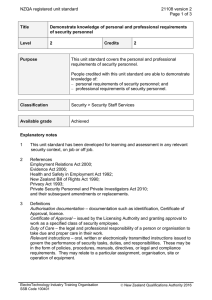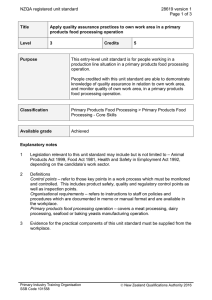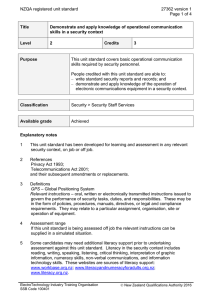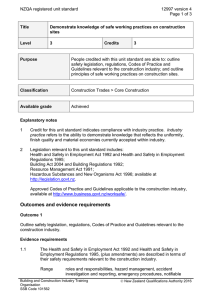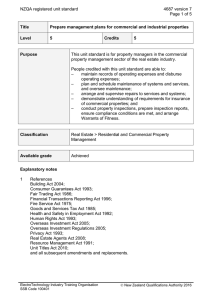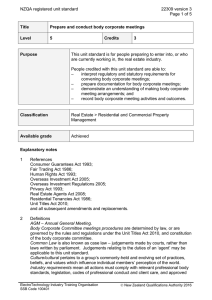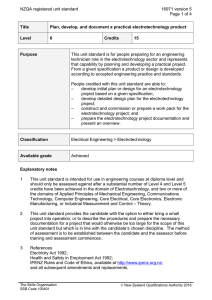NZQA registered unit standard 25633 version 3 Page 1 of 4
advertisement
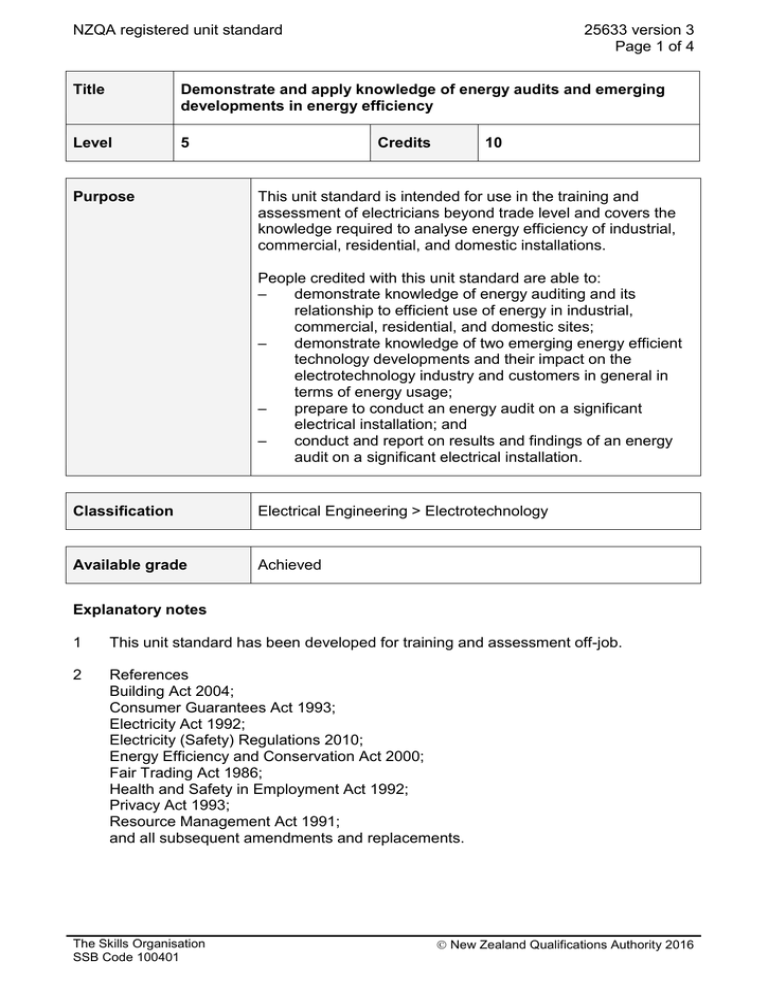
NZQA registered unit standard 25633 version 3 Page 1 of 4 Title Demonstrate and apply knowledge of energy audits and emerging developments in energy efficiency Level 5 Purpose Credits 10 This unit standard is intended for use in the training and assessment of electricians beyond trade level and covers the knowledge required to analyse energy efficiency of industrial, commercial, residential, and domestic installations. People credited with this unit standard are able to: – demonstrate knowledge of energy auditing and its relationship to efficient use of energy in industrial, commercial, residential, and domestic sites; – demonstrate knowledge of two emerging energy efficient technology developments and their impact on the electrotechnology industry and customers in general in terms of energy usage; – prepare to conduct an energy audit on a significant electrical installation; and – conduct and report on results and findings of an energy audit on a significant electrical installation. Classification Electrical Engineering > Electrotechnology Available grade Achieved Explanatory notes 1 This unit standard has been developed for training and assessment off-job. 2 References Building Act 2004; Consumer Guarantees Act 1993; Electricity Act 1992; Electricity (Safety) Regulations 2010; Energy Efficiency and Conservation Act 2000; Fair Trading Act 1986; Health and Safety in Employment Act 1992; Privacy Act 1993; Resource Management Act 1991; and all subsequent amendments and replacements. The Skills Organisation SSB Code 100401 New Zealand Qualifications Authority 2016 NZQA registered unit standard 25633 version 3 Page 2 of 4 3 Definitions Industry practice – those practices that competent practitioners within the industry recognise as current industry best practice. Significant electrical installation – an industrial, commercial, residential, or domestic installation involving a minimum of: lighting and power subcircuits, main switchboard, mains supply, and earthing system and that may require inspection by a registered electrical inspector. 4 All activities must comply with: any policies, procedures, and requirements of the organisations involved; the standards of relevant professional bodies; and any relevant legislative and/or regulatory requirements. 5 Data collection methods may include but are not limited to – surveys, automated data collection, physical measurements. Outcomes and evidence requirements Outcome 1 Demonstrate knowledge of energy auditing and its relationship to efficient use of energy in industrial, commercial, residential, and domestic sites. Range may include but is not limited to – lighting, heating, cooling, ventilation, provision of services, communication, processes. Evidence of three is required. Evidence requirements 1.1 Energy auditing is described in terms of purpose, procedure, and expected outcomes. Range 1.2 energy management, cost, productivity, profitability. Audit benchmarks are described in relation to options, cost benefit, and capital cost of improvements against future energy costs. Outcome 2 Demonstrate knowledge of two emerging energy efficient technology developments and their impact on the electrotechnology industry and customers in general in terms of energy usage. Evidence requirements 2.1 The features of each development are described with reference to advantages, disadvantages, and cost implications, and the sources of information are stated. The Skills Organisation SSB Code 100401 New Zealand Qualifications Authority 2016 NZQA registered unit standard 2.2 Implications and impact of current developments relating to emerging energy efficient technology developments are analysed and explained in accordance with industry practice. Range 2.3 25633 version 3 Page 3 of 4 social, economic, environmental, political, infrastructural, product quality, integrate with existing technology. Evidence of four is required. The objectives, functions, value, and practical applications of the selected emerging energy efficient electrotechnology products or systems are evaluated and described in accordance with industry practice. Outcome 3 Prepare to conduct an energy audit on a significant electrical installation. Evidence requirements 3.1 A plan to analyse energy efficiency is developed. Range purpose of analysis, nature and size of the sample, data confidentiality, data security. 3.2 Access to data sources is established before data collection begins. 3.3 Calibration of measuring equipment matches the accuracy requirements of the plan. Outcome 4 Conduct and report on results and findings of an energy audit on a significant electrical installation. Evidence requirements 4.1 Energy audits are conducted in accordance with the plan and industry practice. 4.2 Data are collected in accordance with the requirements of the plan. Range requirements include but are not limited to – adherence to sampling rate, timeframes, data collection methods, measuring equipment, data relevance, data validity. 4.3 Methods selected for the storage and/or disposal of data conform to confidentiality and security requirements. 4.4 Data are recorded in accordance with plan requirements. Range The Skills Organisation SSB Code 100401 requirements may include but are not limited to – recording timeframe, completeness, legibility, accuracy, sustainability, traceability, consistency, storage, accessibility. Evidence of five is required. New Zealand Qualifications Authority 2016 NZQA registered unit standard 25633 version 3 Page 4 of 4 4.5 Results of calculations performed on the data are verified as correct and meeting plan requirements, and are recorded in accordance with the plan. 4.6 Results and recommendations are reported to the customer in accordance with the plan. Planned review date 31 December 2014 Status information and last date for assessment for superseded versions Process Version Date Last Date for Assessment Registration 1 19 June 2009 N/A Rollover and Revision 2 15 March 2012 N/A Revision 3 15 January 2014 N/A Consent and Moderation Requirements (CMR) reference 0003 This CMR can be accessed at http://www.nzqa.govt.nz/framework/search/index.do. Please note Providers must be granted consent to assess against standards (accredited) by NZQA, before they can report credits from assessment against unit standards or deliver courses of study leading to that assessment. Industry Training Organisations must be granted consent to assess against standards by NZQA before they can register credits from assessment against unit standards. Providers and Industry Training Organisations, which have been granted consent and which are assessing against unit standards must engage with the moderation system that applies to those standards. Requirements for consent to assess and an outline of the moderation system that applies to this standard are outlined in the Consent and Moderation Requirements (CMR). The CMR also includes useful information about special requirements for organisations wishing to develop education and training programmes, such as minimum qualifications for tutors and assessors, and special resource requirements. Comments on this unit standard Please contact The Skills Organisation reviewcomments@skills.org.nz if you wish to suggest changes to the content of this unit standard. The Skills Organisation SSB Code 100401 New Zealand Qualifications Authority 2016

